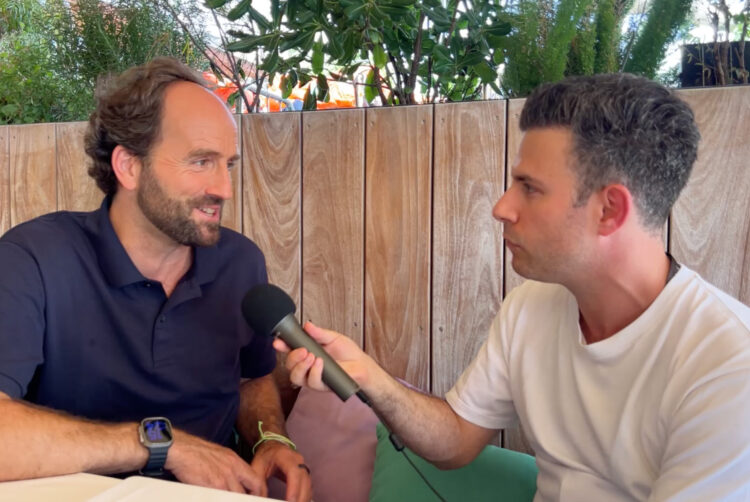David Jones: AI will shake up marketing more than mobile or the internet

The Media Leader Interview: Cannes Lions 2023
The Brandtech Group founder talks to The Media Leader about mega networking, why the industry is failing to grasp the implications of artificial intelligence, and his latest acquisitions.
It might not look like it, but Cannes Lions is the hardest working week of the year.
That’s according to Brandtech Group founder and CEO David Jones, who breathlessly apologises for running late for his interview with The Media Leader at his company’s beach cabana at Cannes.
It’s not that Jones was somewhere else, he explains before we sit down. He is effectively shackled to his pretty beachfront spot, as he cycles through meeting after meeting within the confines of the same cordoned-off area, like a caged zoo exhibit being fed potential investment opportunities and sales pitches.
“I went to look for you but then I caught sight of someone from one of our partner companies… it might only be a two-minute interaction but they add up and they can be important,” he says with a bearded rictus smile. “Imagine if I didn’t do that [short interaction], they’d think ‘oh, David’s not interested!'”
The opening question, “Why does Cannes Lions still matter?” (the theme for this global media leader interview series) has effectively already been answered. But it’s not just networking, it’s mega networking.
“If you look down the beach, you’ve got every single major global tech platform. We’re here between Microsoft on our left, Spotify on the right, Pinterest, Facebook, Google, you’ve got all the tech platforms, you’ve got all of the world’s biggest brands, and advertisers.
“I’ve got all of my company leaders, all of our clients, all of our new business prospects, many of the companies we’d like to talk to or bring in talent that we’d like to hire from.
“You can get more done in one week in Cannes than you probably could flying around the world for a year in terms of meetings. The only downside, though, is that everybody presumes that you’re sitting on a beach drinking rosé! It’s actually the hardest working week of the year, probably.”
But Cannes is different this year, Jones goes on to say, because “there’s even more energy and excitement around it” than in years gone by: “You can just hear the buzz and the noise and people are loving actually being together in real-life.”
Jones has even more to talk about than usual, having completed two acquisition deals this month: the generative AI platform Pencil and digital media services group Jellyfish.
While Jellyfish was a “fantastic deal”, Jones crows, he is most expansive when talking about the potential applications for Pencil. AI, the huge talking point at Cannes this week, rears its head again.
“Pencil is the only company in the world that has spent $1bn of real media across 4,000 brands since 2018. They built the platform on Chat GPT 2, so they’re kind of in a league of their own, and actually have a product that creates ads using Generative AI. [It’s] going to be incredibly impactful for our future…. we’re now over 7,000 people, over a billion dollars in revenue, and growing really strongly.”
If there is a problem with the conversations that are happening at Cannes, Jones says, it’s because “most people [don’t] fully understand just how unbelievably disruptive AI and generative AI is going to be.”
This applies not just to advertising, media and marketing, but to business more generally.
Jones explains: “If we come back and meet here, five years from now, it will have been a bigger change to the world of marketing than the mobile phone was, or a bigger change to the world of marketing than the internet was. It will be a bit redundant, the whole debate about creative and media and not working together. It’s going to change everything and it’s going to be exciting to watch.
“The only people who need to be worried are the ones who think it’s going to go away. You know, [who think] that it’s another Web3. We’re going to see the greatest creative revolution we’ve ever seen. I mean, people immediately default to the negative for every time humans have been given spectacular technology. They’ve done amazing things with it, and the world has progressed.”
The conversation around Generative AI gathered pace at the end of last year when Open AI released Chat GPT as an open-source tool, which led to millions of people around the world being surprised by how quickly a chatbot could carry out credible research and writing assignments simply by being asked a question.
Despite this, he thinks the ad industry, with Cannes as a key talking shop for the sector, could “do a much better job” of being less enamoured with the latest shiny thing and often provoking negative outlooks.
“It’s fashionable to say that AI is going to end the world. I think it’s highly likely that’s climate that will end the world,” Jones says, sternly. “We should be, as an industry and as brands and businesses, doing a lot more in this space. When it comes to a diversity, in every sense, diverse activity, inclusion and belonging, and whether that’s, you know, the people working on the creative side, the people in front of the camera, behind the camera… we’re not doing enough in that space as well.
“[We could be] doing a lot more to show how creativity can impact some of the biggest challenges facing the world. I think that’s missing. I mean, I brought Kofi Annan [the former UN Secretary General] here in 2009, to launch a climate campaign. There’s not much going on like that anymore.”
A full interview with David Jones at Cannes will be available as a podcast episode and video on our YouTube channel next week.




